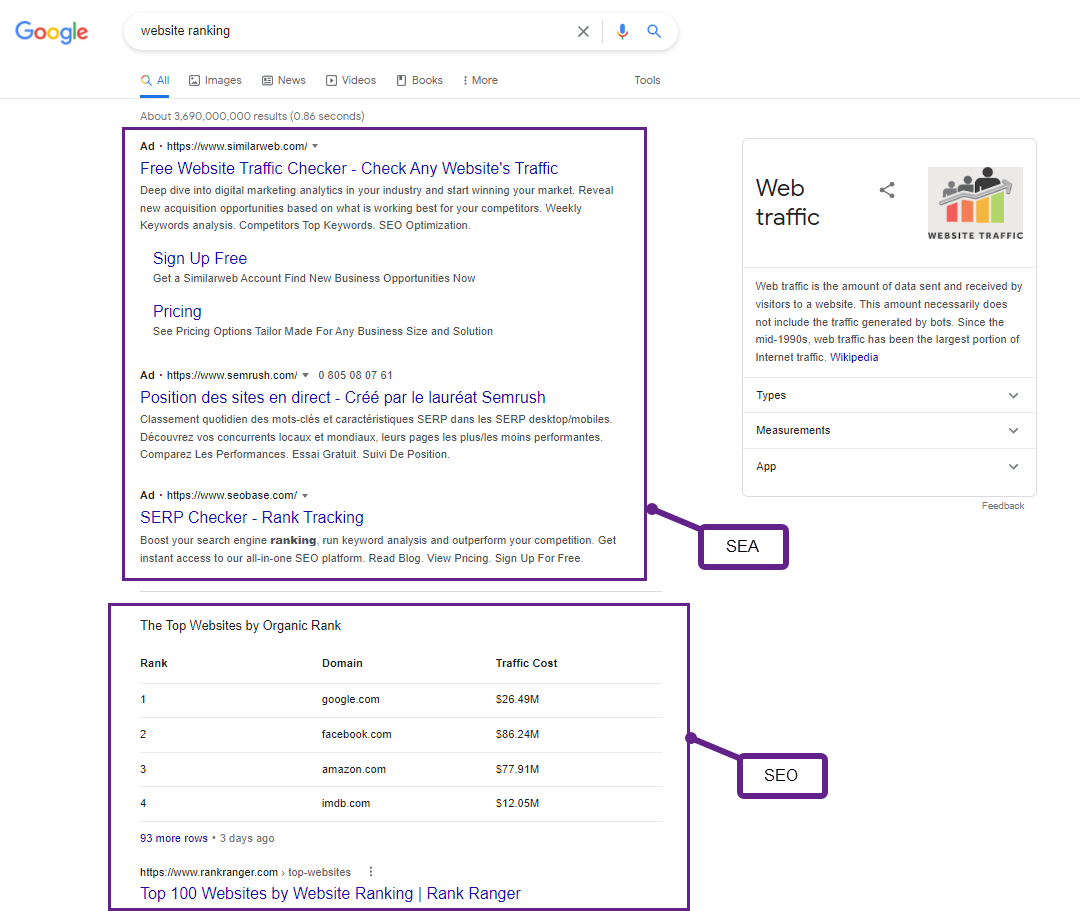First, let’s define SEO. Organic SEO consists in ranking a website or app on first search engine results pages such as Google, Bing, or Yahoo. Google is the most popular search engine (+ 92% of market shares) and SiteW often uses it.
In summary: when you search a term or expression on Google, such as “website ranking”, you have a list of websites which are sorted by preference and relevance depending on search engines. First results are the results related to the keywords you have entered.
First results with the “Ad” mention come from Search Engine Advertising (SEA); that is to say, these websites paid to be visible on this request.

You need to optimize your website organic SEO so that your website ranks on some first search results. If you optimize your website, you will rank on search engines progressively.
SEO is a free, constant traffic source. That’s why your website SEO is one of our priorities.
SiteW demystifies SEO so that it becomes easy for you.
Important information
SEO is an uncertain, long-term job. A high ranking may take up to a week, several months or years before being effective. Here are our tips and methods to enhance your SEO.
How to improve your Google ranking?
Before your website ranks on search engine results pages, your website needs to be indexed. Indexing refers to crawling, which is the process used by search engine web crawlers to visit your website and index your content; that is to say, making it visible on all search engines.
Google registers your website pages as well as their content with its database. Then it sorts them and displays in search results according to internet users’ requests.
Don’t worry! SiteW makes indexing process easier, and does everything for you.
SiteW gives information to search engines to make Google registration automatic.
You can follow the progression of the Google registration of your website on the “My websites” page in the notification area.
Once you have published your website, Premium, E-commerce, or Pro websites are automatically submitted to Google after its creation or modification. On the contrary, we submit Starter websites to Google every 30 days.
Once Google has been notifies, its bots visit your website before indexing it.
How to define your keywords?
A keyword refers to the expression internet users type into search engines.
If you sell shoulder bags for women, you probably want your website to rank on Google when an internet user enters “bag”, “bag for women”, or “shoulder bag”.
Therefore, choose the appropriate keywords to describe your business, and help search engines understand the needs you meet.
Put your keywords everywhere on your website: in your titles, meta descriptions, contents.
💡 Write in natural language to meet Google’s requirements and help it understand your content. Your website will be penalized if you add too many meaningless keywords.
For more information, you can read the following FAQ: edit your titles, meta descriptions and keywords. 👀
Be an expert in web content to enhance your SEO
Expert, developed, and clear content will enhance your organic SEO. Pay attention to your content and work on it to rank on first search results.
Customize your page title and description
When you see a result on search engines, a clickable link with the title will be displayed at the top of the page.
The page description (that is to say the meta description) is just below the title. Your meta description encourages internet users to click on your link instead of clicking on your competitors’ one. You'd be better to have a description length between 150 and 156 characters so that the meta description remains entire.
💡 Customize the meta description of every page according to their content.

SiteW enables you to customize your titles and meta descriptions directly in the Pages tab, in the SEO section.
Please note that Google might change your meta descriptions:
-
If the meta description hasn’t the keyword internet users search, Google offers a more relevant description. Therefore, the meta description can change according to the request.
-
If you have duplicate meta descriptions on your website.
-
If your meta description is too long or too short and needs to be enhanced by Google.
Optimize your internal linking
Internal linking are for optimizing your website organic SEO thanks to internal links. These clickable links go to other website pages. They are for redirecting your readers to other website pages so that they have as much traffic as possible.
Define your anchor links and create consistent internal links between your different pages. Thanks to optimized internal anchor links, you strengthen the relevance of your keywords and related theme.
As you have understood, working on your internal linking enables you to make browsing more fluid for your visitors, and make your website indexing easier.


